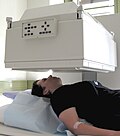DaT scan
DaTscan is a diagnostic imaging procedure that allows for the visualization of the dopamine transporter (DAT) levels in the brain, particularly within the striatum. It is primarily used in the assessment and diagnosis of Parkinsonian syndromes, such as Parkinson's disease, and to differentiate these conditions from other disorders with similar symptoms, such as essential tremor or drug-induced parkinsonism. The DaTscan involves the use of a radioactive tracer, Ioflupane (123I) or ^123I-FP-CIT, which binds specifically to DAT sites in the brain. This tracer is detected by single photon emission computed tomography (SPECT) imaging, providing a detailed picture of the distribution of dopamine transporters.
Indications
DaTscan is indicated for patients with suspected Parkinsonian syndromes where there is a need to differentiate between these and other conditions like essential tremor. It is particularly useful in early stages of disease or when the diagnosis is uncertain. DaTscan is not used to diagnose Parkinson's disease definitively but rather to confirm the presence of dopaminergic degeneration, which supports the diagnosis.
Procedure
The DaTscan procedure involves the intravenous injection of the ^123I-FP-CIT tracer. Patients are usually pre-medicated with thyroid blocking agents to prevent the uptake of iodine by the thyroid gland. Following the injection, there is a waiting period, typically between 3 to 6 hours, to allow for adequate distribution of the tracer within the brain. The patient then undergoes a SPECT scan, which lasts about 30 to 45 minutes. The resulting images provide a visual representation of DAT availability in the brain, with reduced uptake indicating dopaminergic neuron loss.
Interpretation
A normal DaTscan shows a distinct comma or crescent shape of tracer uptake in the striatum. In contrast, a scan indicative of Parkinsonian syndromes will show a significant reduction or absence of tracer uptake, particularly in the putamen, which appears as a loss of the normal comma or crescent shape. It is important to note that while a DaTscan can support the diagnosis of a Parkinsonian syndrome, it cannot distinguish between different types of these conditions.
Risks and Limitations
The risks associated with DaTscan are minimal, primarily related to the exposure to a small amount of radiation. The procedure is generally well-tolerated, with few side effects. However, DaTscan has limitations; it cannot diagnose Parkinson's disease or other Parkinsonian syndromes definitively. It is also not effective in differentiating between these syndromes, such as distinguishing Parkinson's disease from multiple system atrophy or progressive supranuclear palsy.
Conclusion
DaTscan is a valuable diagnostic tool in the assessment of patients with suspected Parkinsonian syndromes, providing visual evidence of dopaminergic neuron loss. It aids in the differentiation of these conditions from other movement disorders but is not a standalone diagnostic test. The interpretation of DaTscan results should always be done in conjunction with clinical evaluation and other diagnostic tests.
Transform your life with W8MD's budget GLP-1 injections from $125.
W8MD offers a medical weight loss program to lose weight in Philadelphia. Our physician-supervised medical weight loss provides:
- Most insurances accepted or discounted self-pay rates. We will obtain insurance prior authorizations if needed.
- Generic GLP1 weight loss injections from $125 for the starting dose.
- Also offer prescription weight loss medications including Phentermine, Qsymia, Diethylpropion, Contrave etc.
NYC weight loss doctor appointments
Start your NYC weight loss journey today at our NYC medical weight loss and Philadelphia medical weight loss clinics.
- Call 718-946-5500 to lose weight in NYC or for medical weight loss in Philadelphia 215-676-2334.
- Tags:NYC medical weight loss, Philadelphia lose weight Zepbound NYC, Budget GLP1 weight loss injections, Wegovy Philadelphia, Wegovy NYC, Philadelphia medical weight loss, Brookly weight loss and Wegovy NYC
|
WikiMD's Wellness Encyclopedia |
| Let Food Be Thy Medicine Medicine Thy Food - Hippocrates |
Medical Disclaimer: WikiMD is not a substitute for professional medical advice. The information on WikiMD is provided as an information resource only, may be incorrect, outdated or misleading, and is not to be used or relied on for any diagnostic or treatment purposes. Please consult your health care provider before making any healthcare decisions or for guidance about a specific medical condition. WikiMD expressly disclaims responsibility, and shall have no liability, for any damages, loss, injury, or liability whatsoever suffered as a result of your reliance on the information contained in this site. By visiting this site you agree to the foregoing terms and conditions, which may from time to time be changed or supplemented by WikiMD. If you do not agree to the foregoing terms and conditions, you should not enter or use this site. See full disclaimer.
Credits:Most images are courtesy of Wikimedia commons, and templates, categories Wikipedia, licensed under CC BY SA or similar.
Translate this page: - East Asian
中文,
日本,
한국어,
South Asian
हिन्दी,
தமிழ்,
తెలుగు,
Urdu,
ಕನ್ನಡ,
Southeast Asian
Indonesian,
Vietnamese,
Thai,
မြန်မာဘာသာ,
বাংলা
European
español,
Deutsch,
français,
Greek,
português do Brasil,
polski,
română,
русский,
Nederlands,
norsk,
svenska,
suomi,
Italian
Middle Eastern & African
عربى,
Turkish,
Persian,
Hebrew,
Afrikaans,
isiZulu,
Kiswahili,
Other
Bulgarian,
Hungarian,
Czech,
Swedish,
മലയാളം,
मराठी,
ਪੰਜਾਬੀ,
ગુજરાતી,
Portuguese,
Ukrainian
Contributors: Prab R. Tumpati, MD




